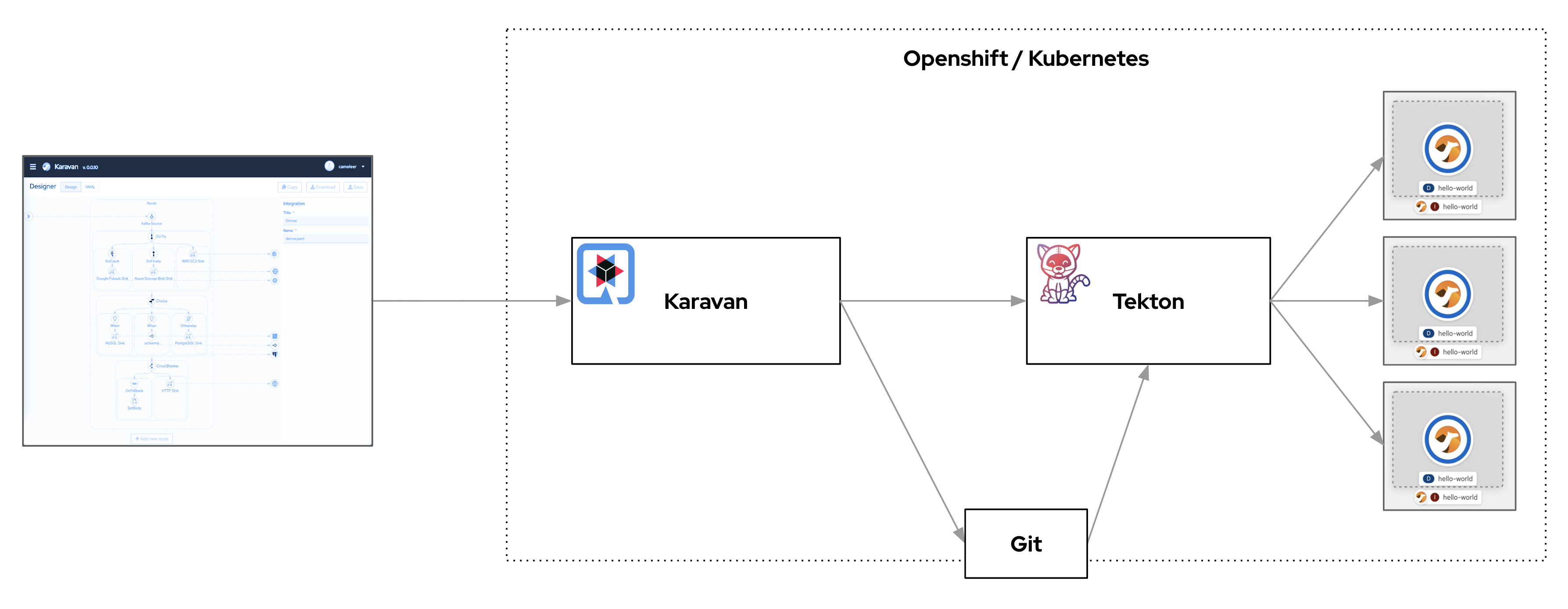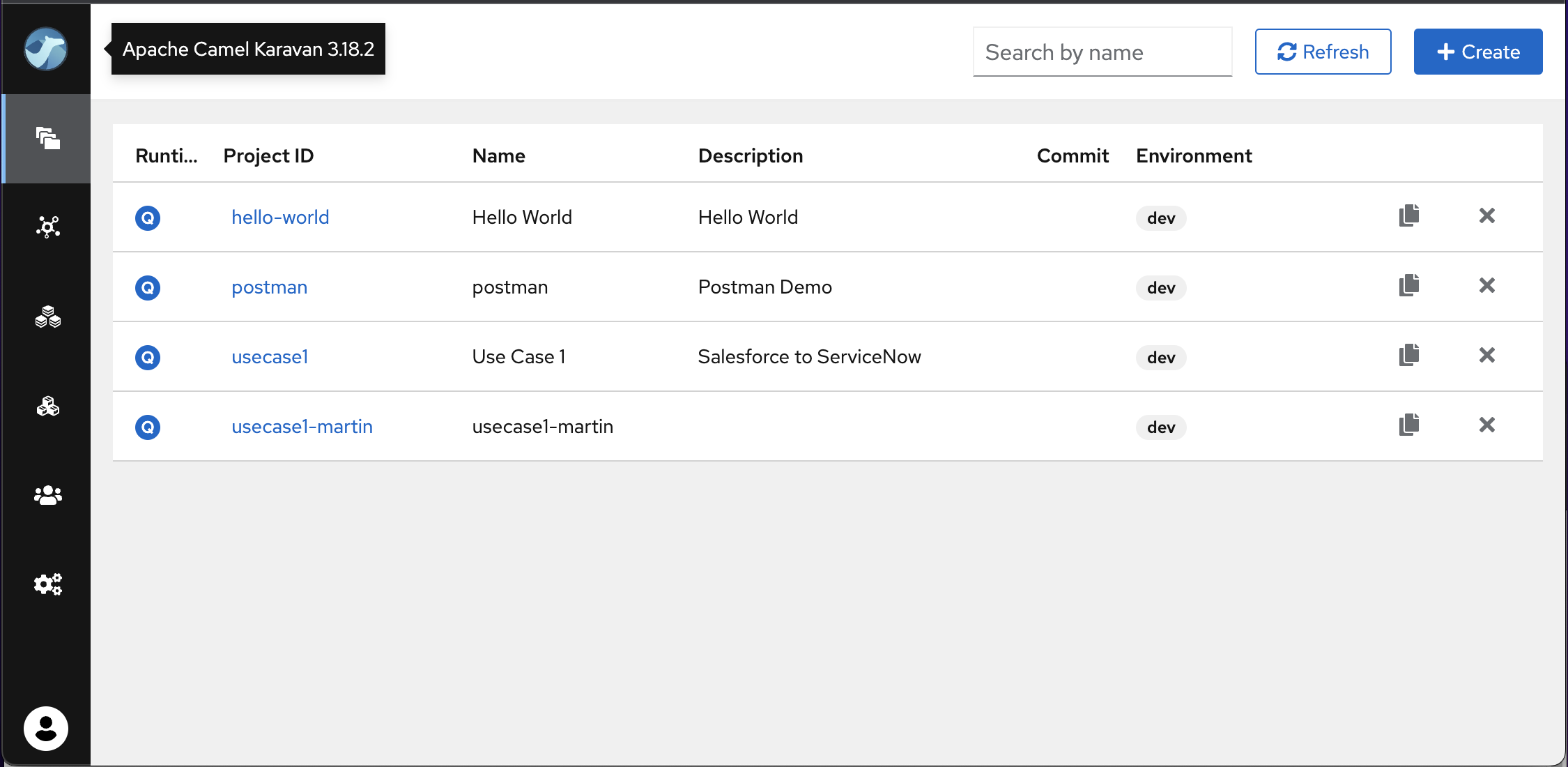
Karavan is an Integration Toolkit for Apache Camel aimed to increase developer performance through the visualization of routes, integration with runtimes and pipelines for package, image build and deploy to kubernetes out-of-the-box.
Karavan Visual Designer for Integrations supports:
- Enterprise Integration Patterns DSL
- REST DSL
- OpenAPI to REST DSL generator
- Beans and dependencies
- All Kamelets source/sink/action
- All Components consumer/producer
- Integration CRD (*.yaml with kind:Integration) and plain yaml routes
Karavan integrates with the following Camel Runtimes:
- Camel Jbang (local run)
- Camel Quarkus (export and CI pipeline)
- Camel Spring-boot (export only)
- Camel Main (export only)
Karavan can be used as:
- a cloud-native application in Kubernetes/OpenShift (FKA cloud/serverless mode)
- a VS Code extenson
Disclamer:
The version of Karavan is now aligned to the Camel release that the UI designer is based upon. This makes it easier to understand which Camel version Karavan can be used as design editor. However Karavan 3.18 is not LTS.
Designer Improvements
Step EIP
To make route clean and good looking user can incapsulate integration logic using Step EIP.
Step element in Karavan is expanded when selected and collapsed when not selected.

For existing routes it is possible to move existing DSL elements into Step DSL

Cloud-native Itegration Toolkit
Karavan cloud-native integration toolkit aimed to be deployed to OpenShift (Kubernetes version is comming) to provide full lifecycle for integrators to build, deploy and monitor their integrations in OpenShift/Kubernetes.
Architecture
Cloud-native mode includes end-user application integrated with Git repository to store projects, Tekton pipelines to build and deploy integrations to OpenShift/Kubernetes and all menifests required to deploy the toolkit itself. Check how to deploy Karavan to OpenShift.

Projects
One of the new features in this preview release is projects. Although projects temporary stored in build-in or external Infinispan Karavan uses Git as permanent project storage. Git repository, user and token are configured in Karavan deployment manifest


Build and deploy
Karavan uses Tekton Pipelines to build and deploy integrations. Pipeline generates canonical camel-quarkus maven project, then maven package command makes compilation, image build and deployment. No magic!
Caninical Tekton Task and Pipeline come with Karavan. However they could be customize by users to align with their internal requitrements, common practices and standards.

Kubernetes integration
Starting from 3.18 Camel supports placeholders for secrets and configMaps Karavan supports them as well. In addition Karavan provides selectors for ConfigMaps, Secrets and Services retrieved from Kubernetes.

VS Code extension
For developers and integrator who prefer local development Karavan could be used as a VS Code extension. In addidion to the main feature - visual integration designer, Karavan provides a developer performance booster: integration with camel-jbang.
Run application
Create integration using visual designer and then just click run button to run it locally using camel-jbang. If --dev mode is on (configurable in VS Code Settings) your integration reloads while editing. This gives a quick feedback loop.

Create Application
For advanced features like additional dependencies, export to maven, deployment to Kubernetes/OpenShift camel-jbang requires application.properties file configured. User can create it using Karavan with predefined properties for Camel-Qurkus (Spring-Boot and Camel-Main to come). Predefined properties are configurable in VS Code Settings.

Export
The latest Camel-jbang 3.18 implements export plain projectless integrations to canonical maven projects. Karavan provides integration with this feature. Preconfigured application.properties (see above) makes this process simple and smooth.

Feedback is gold
Deploy Karavan as a cloud-native integration toolkit or install VS Code extension from the Marketplace.
If you have any idea or find a new issue, please create a new issue report in GitHub!